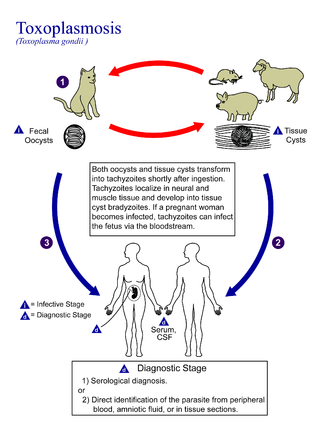
noun Pathology.
- infection with the parasite Toxoplasma gondii, transmitted to humans by consumption of insufficiently cooked meat containing the parasite or by contact with contaminated cats or their feces: the illness produced is usually mild, but in pregnant women may damage the fetus.
noun
- a protozoal disease characterized by jaundice, enlarged liver and spleen, and convulsions, caused by infection with Toxoplasma gondii
1977, from toxoplasma (1926), coined 1909 in French from toxo-, comb. form of Greek toxon (see toxic) + plasma (see plasma).
n. pl. tox•o•plas•mo•ses (-mō′sēz)
- An infectious disease caused by the protozoan Toxoplasma gondii. The congenital form, resulting from parasites in the infected mother being transmitted to the fetus, is characterized by lesions of the central nervous system that can cause blindness and brain damage. Acquired toxoplasmosis is characterized by fever, swollen lymph nodes, and lesions in the liver, heart, lungs, and brain.
- An infectious disease caused by the protozoan Toxoplasma gondii that can be transmitted by infected humans and animals, especially cats, often by contact with feces. Toxoplasmosis can be a mild illness with fever and swollen lymph nodes, or progress to severe damage to the liver, heart, lungs, and brain. Fetuses that become infected during pregnancy may have congenital blindness and brain damage.
 Liberal Dictionary English Dictionary
Liberal Dictionary English Dictionary